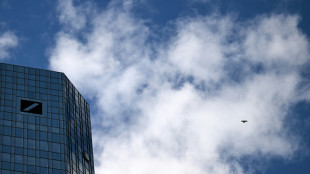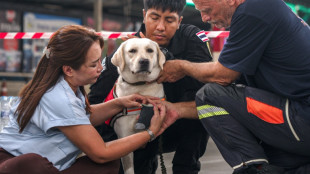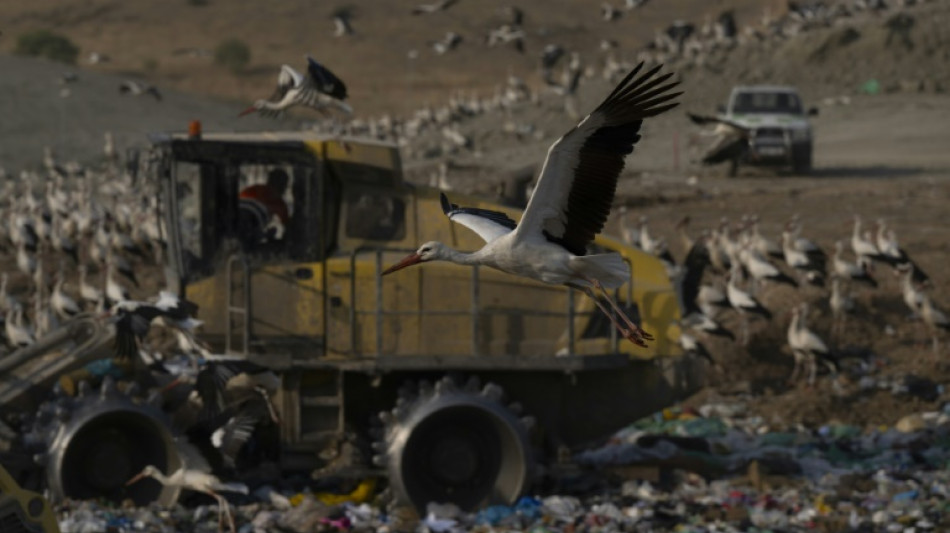
-
 Health concerns swirl as Bolivian city drowns in rubbish
Health concerns swirl as Bolivian city drowns in rubbish
-
Syria says deadly Israeli strikes a 'blatant violation'

-
 Financial markets tumble after Trump tariff announcement
Financial markets tumble after Trump tariff announcement
-
Starbucks faces new hot spill lawsuits weeks after $50mn ruling

-
 Europe riled, but plans cool-headed response to Trump's tariffs
Europe riled, but plans cool-headed response to Trump's tariffs
-
'Shenmue' voted most influential video game ever in UK poll

-
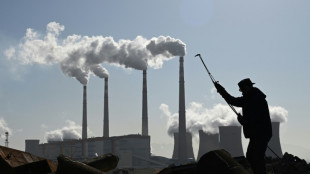 New coal capacity hit 20-year low in 2024: report
New coal capacity hit 20-year low in 2024: report
-
Revealed: Why monkeys are better at yodelling than humans

-
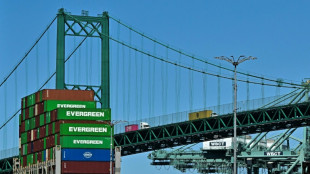 Key details on Trump's market-shaking tariffs
Key details on Trump's market-shaking tariffs
-
'A little tough love': Top quotes from Trump tariff talk

-
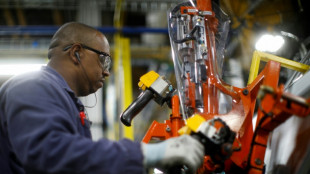 US business groups voice dismay at Trump's new tariffs
US business groups voice dismay at Trump's new tariffs
-
Grealish dedicates Man City goal to late brother

-
 US tariffs take aim everywhere, including uninhabited islands
US tariffs take aim everywhere, including uninhabited islands
-
Trump sparks trade war with sweeping global tariffs

-
 Israeli strikes hit Damascus, central Syria; monitor says 4 dead
Israeli strikes hit Damascus, central Syria; monitor says 4 dead
-
Slot 'hates' offside rule that gave Liverpool win over Everton

-
 US stocks end up, but volatility ahead after latest Trump tariffs
US stocks end up, but volatility ahead after latest Trump tariffs
-
Barca oust Atletico to set up Clasico Copa del Rey final

-
 Mourinho grabs Galatasaray coach's face after losing Istanbul derby
Mourinho grabs Galatasaray coach's face after losing Istanbul derby
-
Grealish strikes early as Man City move up to fourth in Premier League

-
 Reims edge out fourth-tier Cannes to set up PSG French Cup final
Reims edge out fourth-tier Cannes to set up PSG French Cup final
-
Liverpool beat Everton as title looms, Man City win without Haaland

-
 Jota wins bad-tempered derby as Liverpool move 12 points clear
Jota wins bad-tempered derby as Liverpool move 12 points clear
-
Inter and Milan level in derby Italian Cup semi

-
 Stuttgart beat Leipzig to reach German Cup final
Stuttgart beat Leipzig to reach German Cup final
-
Trump unveils sweeping global tariffs

-
 Italian director Nanni Moretti in hospital after heart attack: media
Italian director Nanni Moretti in hospital after heart attack: media
-
LIV Golf stars playing at Doral with Masters on their minds

-
 Trump unveils sweeping 'Liberation Day' tariffs
Trump unveils sweeping 'Liberation Day' tariffs
-
Most deadly 2024 hurricane names retired from use: UN agency
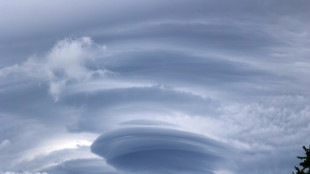
-
 Boeing chief reports progress to Senate panel after 'serious missteps'
Boeing chief reports progress to Senate panel after 'serious missteps'
-
Is Musk's political career descending to Earth?

-
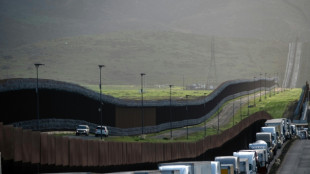 On Mexico-US border, Trump's 'Liberation Day' brings fears for future
On Mexico-US border, Trump's 'Liberation Day' brings fears for future
-
Starbucks faces new hot spill lawsuit weeks after $50mn ruling

-
 Ally of Pope Francis elected France's top bishop
Ally of Pope Francis elected France's top bishop
-
'Determined' Buttler leads Gujarat to IPL win over Bengaluru

-
 US judge dismisses corruption case against New York mayor
US judge dismisses corruption case against New York mayor
-
Left-wing party pulls ahead in Greenland municipal elections
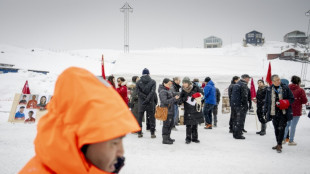
-
 Blistering Buttler leads Gujarat to IPL win over Bengaluru
Blistering Buttler leads Gujarat to IPL win over Bengaluru
-
Tesla sales slump as pressure piles on Musk

-
 Amazon makes last-minute bid for TikTok: report
Amazon makes last-minute bid for TikTok: report
-
Canada Conservative leader warns Trump could break future trade deal

-
 British band Muse cancels planned Istanbul gig
British band Muse cancels planned Istanbul gig
-
'I'll be back' vows Haaland after injury blow

-
 Trump to unveil 'Liberation Day' tariffs as world braces
Trump to unveil 'Liberation Day' tariffs as world braces
-
New coach Edwards adamant England can win women's cricket World Cup

-
 Military confrontation 'almost inevitable' if Iran nuclear talks fail: French FM
Military confrontation 'almost inevitable' if Iran nuclear talks fail: French FM
-
US stocks advance ahead of looming Trump tariffs

-
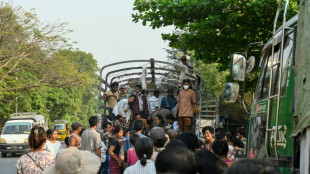 Scramble for food aid in Myanmar city near quake epicentre
Scramble for food aid in Myanmar city near quake epicentre
-
American Neilson Powless fools Visma to win Across Flanders


Storks give up migrating to live on landfill in Spain
At a sprawling landfill near Madrid, hundreds of white storks dodge garbage trucks as they look for scraps of food among the mountains of multicoloured garbage bags.
The long-legged birds have traditionally flown from across Europe to African pastures for the winter and returned in the spring.
But the abundant food found in landfills combined with warmer weather are making growing numbers of storks skip this arduous journey and stay in Spain for the winter.
"For us they are part of the landscape," said Carlos Pinto, a sanitation worker at a landfill in Pinto some 30 kilometres (18 miles) south of Madrid.
The landfill receives between 200 tonnes and 300 tonnes of food waste per day and the storks head immediately to the zones "where there is fresh garbage," he added.
The scene is repeated across Spain, with many storks opting to nest close to landfill sites where they live year-round.
In Alcala de Henares, the birthplace of "Don Quixote" author Miguel de Cervantes near Madrid, white storks have become a symbol of the town because they have become so numerous.
"Wherever you look, there are storks," said Almudena Soriano, the town's veterinarian.
Stork nests crown the Alcala's bell towers and the clattering sound they make with their long beaks can be heard throughout the town.
In 1970 the town counted just ten stork nests. A census carried out in 2021 found 109 nests -- a more than tenfold increase -- that were home to up to 300 storks.
- Garbage 'buffet' -
Soriano estimates that "about 70 percent of storks no longer migrate" to Africa, mainly because of the easily available food they can find in Spain in landfills.
This allows them to avoid the dangerous crossing of the Strait of Gibraltar separating Spain from Morocco which measures just 14 kilometres (nine miles) but is often battered by strong winds.
"Many die on the way. The adult storks who have already made the trip do not want to repeat the experience," said Soriano.
"And since they move to find food, an open dump for them is an all-you-can-eat buffet. There is no need to leave anymore."
A 2020 census by SEO Birdlife found 36,217 white storks in Spain.
Before, Spain was just a stop on the birds' annual migration to Africa but now a significant number of white storks spend the winter in the country, according to the NGO.
This includes storks born in Spain as well as those that come from European nations further north like Denmark, Germany and the Netherlands.
Some storks return to northern Europe after winter while others remain permanently in Spain.
Younger storks still have the instinct to migrate to Africa but they make the trip without their parents, said SEO Birdlife ornithologist Blas Molina.
- Climate change -
While the easy availability of food at landfills is the main reasons storks have stopped migrating, it is also "probably due to tendency towards higher temperatures" caused by climate change, the NGO said in a recent report.
Adult storks are staying "a little bit further north" within the Iberian Peninsula whereas before they stopped off in the southeastern region of Extremadura and Andalusia in the south, said Molina.
The change in the stork's migratory habits is a clear example of the "effects of human activity on biodiversity," he added.
The municipality of Pinto is considering covering its landfill site to prevent storks from swallowing plastic and other potentially harmful items. If it does, the storks may leave.
Alcala closed its landfill last year but set up giant feeding stations to ensure the storks had enough to eat and stayed in the town.
The scheme appears to be working as the town's stork populations has held steady.
S.F.Warren--AMWN
